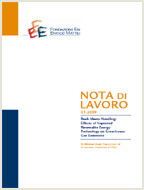Bargaining and Delay in Trading Networks

02.01.2013
Mikel Bedayo, Ana Mauleon, Vincent Vannetelbosch
C70, D60, J50
Bargaining, Trading networks, Private information
Climate Change and Sustainable Development
Carlo Carraro
We study a model in which heterogeneous agents first form a trading network where link formation is costless. Then, a seller and a buyer are randomly selected among the agents to bargain through a chain of intermediaries. We determine both the trading path and the allocation of the surplus among the seller, the buyer and the intermediaries at equilibrium. We show that a trading network is pairwise stable if and only if it is a core periphery network where the core consists of all weak (or impatient) agents who are linked to each other and the periphery consists of all strong (or patient) agents who have a single link towards a weak agent. Once agents do not know the impatience of the other agents, each bilateral bargaining session may involve delay, but not perpetual disagreement, in equilibrium. When an agent chooses another agent on a path from the buyer to the seller to negotiate bilaterally a partial agreement, her choice now depends both on the type of this other agent and on how much time the succeeding agents on the path will need to reach their partial agreements. We provide sufficient conditions such that core periphery networks are pairwise stable in presence of private information.
